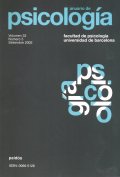Desarrollo y evaluación de un procedimiento empírico para la detección de la simulación de enajenación mental en el contexto legal
Keywords:
malingering, faking, mental disorder, criminal responsibility, forensic psychology, MMPI.Abstract
In a simulated criminal insanity task, a sample of experts in psychopathology and laypeople were asked to simulate a mental disorder in order to avoid criminal responsibility. Subjects had previously been evaluated by MMPI before the test and had provided responses within normal ranges. The results reveal a high level of malingering (78.8% of the subjects could simulate insanity), and no differences were observed between laypeople and experts. The effectiveness of the control scales of the MMPI and the conjiguration of the scales of validity was conjirmed though they have a margin of error, since they fail to classify 7.5% of subjects who simulated criminal insanity in order to be acquitted. Moreover, the scales are not a robust index because alternative hypotheses need to be studied. A complementary instrument was therefore used, un open clinical interview with the same format as the cognitive interview. This procedure was much more difficult to simulate, since 58.8% were incapable of simulating insanity; thefigure rose to 71.25% when considering the absence of internal consistency in the interview. Nevertheless, the margin of error was significant: 28.75. Consequently, a multimethod approach (MMPI and interview)was compared, and found to classify all subjects correctly. Thus, we recommend a "convergenit invalidity" procedure based on ut least two methods of assessing inconsistency in order to label a protocol as a malingerer. Our proposal also includes the use of the Clinical Decision Model (Cunnien, 1997) for the detection of false positives. Decision Practical guidelines are established for the detection of simulated and false positives in the legal context.
Downloads
Published
2002-01-13
Issue
Section
Articles
License
The authors who publish in this journal agree to the following terms:
Authors transfer to the publisher all copyright for the full term of protection and for all the world.
The authors can post a copy of their articles in accordance with the policy of free access to the journal.


